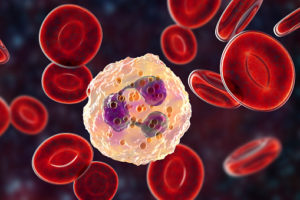Osteopontin (OPN) is a proinflammatory, multifunctional protein with both physiological and pathological roles. Since OPN attracts neutrophils, which are involved in the pathophysiology of transfusion-related acute lung injury (TRALI), researchers hypothesized that OPN may play a role in the development of TRALI. Using a murine TRALI model, OPN knock-out (KO) mice were not susceptible to TRALI compared to wild type mice. Intravenously injecting OPN into OPN KO mice restored the TRALI response and neutrophil accumulation in the lungs while using an anti-OPN antibody inhibited TRALI induction. TRALI induction was also dependent on macrophages and OPN polymerization but was not dependent the OPN receptor CD44, macrophage inflammatory protein-2 (MIP-2, the murine homolog of human IL-8), or interleukin-6 (IL-6). These data suggest that OPN recruits neutrophils to the lungs independent of MIP-2, IL-6 or other PMN attractants, and TRALI induction in humans may possibly be blocked by using anti-OPN antibodies.
Reference:

